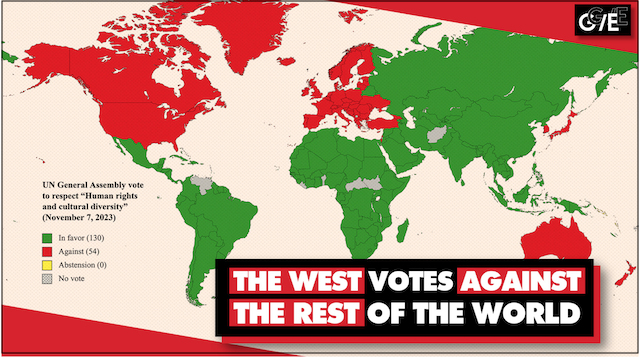
This map, from Multipolarista, shows the US-centred Empire bloc of nations (in red) that subscribe to the US-invented Rules Based International Order. The countries in green do not recognize that order, and they continue to support de facto a UN-centred international system governed by international law.
There was a meeting a couple of years ago between the US and China where the two sides — pro-Empire and pro-Multipolarity — each used their own coded language to express what they had been conditioned, very differently, to believe to be in the best interests of world order and security. Clinton Fernandez, an Australian professor and former intelligence officer, recounts the event in his book Sub-Imperial Power:
AT A HIGH-LEVEL SUMMIT between the United States and China in March 2021, the US Secretary of State said he was ‘committed to leading with diplomacy to advance the interests of the United States and to strengthen the rules-based international order’. The director of China’s Foreign Affairs Commission countered by saying that China and the international community upheld ‘the United Nations–centred international system and the international order underpinned by international law, not what is advocated by a small number of countries of the so-called rules-based international order’.
China was essentially saying that the ‘rules-based international order’ was simply a euphemism for the will of the (US) Empire, and that China would fiercely oppose that Empire in favour of an ‘international order’ underpinned by international law (ie governed, at least ostensibly, in the interests of the people, not that of corporate wealth and power, and based on bilateral negotiations between autonomous nations, not the edicts of Empire).
This is perhaps the ultimate expression of the 21st century’s greatest “clash of ideologies”, one that could quite conceivably end in nuclear annihilation. Each side wants, and each side stated in this conversation, what it believes is in the best interests of its people. While both reflect selfish interests, what underlies them are diametrically opposed ideologies bordering (thanks to generations of consistent conditioning, xenophobia, and hate-mongering) on religions.
The Empire sincerely believes that its model, with the appearance or at least promise of ‘representative democracy’ and ‘free enterprise’, is the best model. It’s a model that presumes the rich and powerful (who presumably became so by virtue of personal merit) know better than the ‘average citizen’ what’s best for everyone. It’s a top-down ideological model, an essentially military one. A “crusade” model.
The Multipolarists, on the other hand, sincerely believe that individual nations are best suited to determine and act in the best interests of their citizens, and that those interests are best identified through continuous negotiation with, and education of, their citizens, at the most local level, leading then to bilateral agreements between nations. It’s a bottom-up ideological model, though the route up from the bottom may often be onerous, opaque, bureaucratic and even impervious.
Ideologies have never worked at any scale in our civilization’s political systems. Both models are fatally flawed, and both are on a collision course with the limits to growth, the inherent frailties in all large systems, and the accelerating multi-faceted collapse of most of the world’s economic and ecological systems.
So, to translate: Rules Based International Order means, essentially, the order established by the US Empire, which is itself exempt from the ‘rules’ it makes. It is the order that assumes that the only means of preventing global chaos and collapse is for the Empire to control the whole world, and remake all societies in its image, which is manifestly exceptional and inherently superior to all others. It is maintained by an overwhelming show of force — nearly 1,000 massive, nuclear-armed US/NATO Empire military bases perched on the doorstop of all nations not aligned with the Empire, and by direct intervention in the politics of these unaligned nations to coerce them to join the Empire or smash them so they can be dismantled and expropriated.
It doesn’t sound all that palatable when you put it that way. And it’s hard to believe that what China, the largest trading partner of, and investor in, most of the world’s nations, offers could possibly be worse.
That’s how it seems to me, anyway.





One virtually unnoticed benefit of the US Empire has been the freedom of the seas and the lack of piracy. It’s been so long since anyone had to worry about international shipping that most people forget how vulnerable it is.
If a multi-polar world wants to keep the freighters and tankers sailing, and do so without depending on the Empire, it’s going to need to create something akin to the US Navy. I’m sure the US taxpayer would be delighted to let the UN or some other international entity take over and have China foot the bill. Let the BRICs do it.
So, unless China and others are willing to police the world’s oceans and let every ship go where it wants, the situation could easily be far worse. I suspect China wants to have its cake and eat it too. Unencumbered international shipping and trade at US expense.
Well, for sure there is a conflict, saying that china likes a multipolar world is untrue. It is just an ’empire’ trying to fight another ’empire’ in a power struggle, I really do not belive that they would accept an Indian power